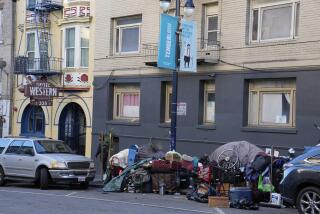San Diego’s No Place to Be in Hard Times
- Share via
San Diego is the place where the climate is even, where heaven meets the beach every evening. But, for my family, San Diego was a place we had to flee to survive.
To the outside eye, I had it all: a two-bedroom apartment in Ocean Beach for “only” $700 a month, a husband, two children and lots of goodies.
But my husband was an active alcoholic, and money flowed through our house like waves through sand. After eight years of marriage, I filed for divorce. We were both unemployed. He had lost several jobs, and I was laid off from my construction job because of the slow housing market.
I sold everything we owned to try to pay the mounting bills. I had few marketable skills but was able to find some part-time work. It just wasn’t enough to keep the bill collectors away or pay the rent. I was in three courtrooms that month: to file for bankruptcy and divorce and to be evicted.
That is when I found out what the real San Diego is about. I turned to social service programs, but found no help. We hadn’t been broke or separated long enough for me to be eligible for welfare. And, besides, it wouldn’t have covered the rent. What I needed was housing assistance. But I was told that the programs were backlogged and that the waiting list was at least two years.
The only housing I could afford with the small disability check my children receive was a one-room converted garage.
I had two choices: the streets or the shelters. For me, neither was an option. I needed some housing, job training and child care to get back on my feet. They weren’t available in San Diego.
With one week until eviction and no money, I decided I had to leave San Diego. My friends were all in San Diego. I had found emotional help through a 12-step program there. But, financially, there was no way I could build a new life in such an expensive city.
Fortunately, I had an aunt and uncle in Lincoln, Neb., who said they would take the three of us in for a few weeks. I’d never been to the cornfields, but the move was a chance I had to take. I had nothing to lose. So, with a loan of $300 from a friend, I packed my kids and my clothes in my small car and headed east.
It was the right decision. Lincoln offers more than 120 programs for families in crisis. Within six weeks, I had hooked up with 21 of them.
Like government programs anywhere, there were forms a mile long to fill out. And each program had its own set of hoops. The difference was the programs in Lincoln were accessible.
With $449 a month in income from child support and disability, we are not eligible for welfare, but we receive food stamps, and our health care is covered by Medicaid. Those basics would probably have been available in San Diego. But, unlike San Diego, Lincoln also makes low-income housing available. Through a subsidized program, we were able to move into a large two-bedroom apartment--at least as nice as the one we had in Ocean Beach, for only $70 a month. Even the deposit was paid.
These services and others have made it possible for us to survive. But Lincoln provides more than the basics. And it’s the other help we receive in Lincoln that will buy us a future.
Through a combination of federal tuition grants and child care assistance, I am able to attend college. As long as I make good grades and take a full course load, child care is available for my 8-year-old son and 6-year-old daughter while I am on campus. My books are also covered, and my 3.75 grade point average qualifies me for an extra $100 per quarter. That buys the boots and coats that we didn’t need in San Diego and helps keep a used car running.
Apparently about 10 years ago, Nebraska decided to set up preventive programs. As a result, I have a chance to get off of public assistance.
Instead of using my energy in San Diego to literally survive, I am now able to go to college full time, plus guide my children and give them a stable home life. I hope someday to give this community what it has given me. A chance.
BACKGROUND
Gov. Pete Wilson recently suggested that new residents of California be required to wait for perhaps as long as three years before becoming eligible to receive public health and welfare benefits. The object would be to discourage poor people from moving to the state, which has relatively high benefits. While acknowledging that courts have forbidden states from establishing such waiting periods, Wilson says, “I happen to think those cases are wrong.” Without such limits, he said, “you have a situation in which you are risking the health of your economic base.”
More to Read
Sign up for Essential California
The most important California stories and recommendations in your inbox every morning.
You may occasionally receive promotional content from the Los Angeles Times.






